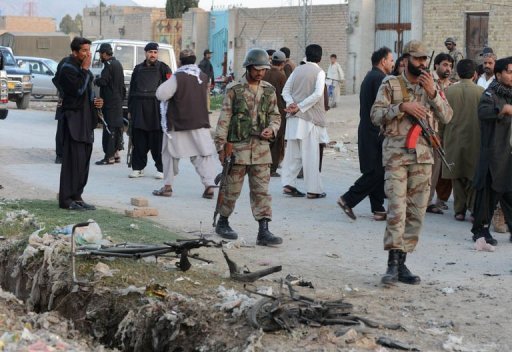(AFP) Attacks by the Pakistani Taliban are forcing the main party in the country’s restive northwest, an important battleground in the upcoming general election, to campaign in the shadows.
The Awami National Party (ANP) ruled Khyber Pakhtunkhwa province for the past five years, but it is now bearing the brunt of a wave of Taliban violence as the country heads towards the May 11 general election.
The umbrella Tehreek-e-Taliban Pakistan (TTP) faction has vowed to target the country’s three main secular parties which formed the outgoing national government — the ANP, the Muttahida Qaumi Movement and the Pakistan People’s Party of President Asif Ali Zardari.
More than 50 people have been killed in shootings and bombings on political targets since April 11, according to an AFP tally, and around half of the deaths have come in attacks targeting the ANP.
Ghulam Bilour, a leading figure in the ANP, narrowly escaped with his life on April 16 when a suicide bomber targeted his car in Peshawar, the main city of the northwest, killing 16 people.
Since the TTP assassinated his younger brother Bashir, the number two in the provincial government, in December, Ghulam has carried the fight and is determined to carry on.
But in the face of Taliban threats, the ANP has abandoned large meetings and only meets activists and supporters in small secure places.
Haroon Bilour, Bashir’s son and a candidate for the provincial assembly, says the threats have hampered the party’s ability to campaign.
His rivals from the conservative right — religious parties and ex-cricketer Imran Khan’s PTI party — already boosted by a desire for change among voters, have had no problem organising large meetings.
Haroon complained that his rivals “are not even condemning Taliban attacks against us”.
The TTP is opposed to secular democracy in principle, viewing it as incompatible with Islamic belief, and their dislike of the secular PPP, ANP and MQM was intensified by the federal government’s backing of military operations against militants in the northwest.
Even in its traditional stronghold Peshawar, the ANP has suffered the pains of incumbency: judged to be incapable of stopping Taliban violence and held responsible for the rampant inflation and crippling power shortages that make ordinary voters’ lives a misery.
Its strong stance against the TTP and association with military offensives have also led to the ANP being accused of being too “pro-American” — electoral poison in a country where anti-US feeling runs high.
The party has a fight on its hands, but the threat of violence has forced Haroon to order his activists to mount a low-key campaign.
He has learned from his father Bashir, who he says never missed a single reception in Peshawar, sometimes going to 12 weddings in a single day.
His colleague Mian Iftikhar Hussain, another ANP leader, has also been reduced to pacing like a caged lion in the party headquarters in Peshawar, because the threats have stopped him campaigning for reelection even in his home town of Pabbi.
Hussain’s rival in Pabbi, Khaliq ur-Rehman of the PTI, is doing well with a plan promising to eradicate hepatitis C and his calls for dialogue with the Taliban. The attacks on the ANP do not move him.
But where Hussain and most of the rest of the ANP candidate are fighting the election with one hand tied behind their backs, the Bilours at least have the local strength of the family name to fall back on.
Ghulam faces Imran Khan, the rising star of Pakistani politics, as he seeks re-election and the old campaigner has form for seeing off celebrity candidates — in 1990 he beat the PPP icon and former prime minister Benazir Bhutto.

COMMENTS
Please let us know if you're having issues with commenting.